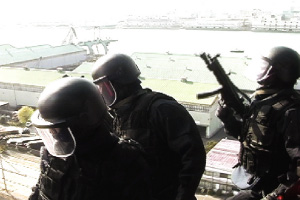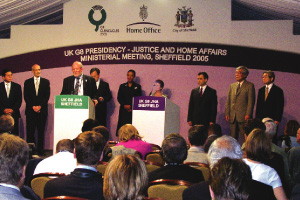1. Improving and Strengthening Various Forces
In addition to measures designed to prevent terrorism, in preparing for the possible occurrence of emergency situations such as terrorist attacks, the police are improving and strengthening their structures and equipment. They are also improving the materials of groups such as the Counter-NBC Terrorism Squads who respond to terrorism such as biochemical terrorist attacks, the Anti-Firearms Squads who provide security at important facilities and for handling incidents involving firearms, and the Special Assault Teams (SAT) who handle serious terrorist attacks such as hijackings and incidents in which important facilities are occupied. (In September 2005, SAT was newly deployed for Okinawa Prefectural Police, in addition to the seven Prefectural Police.) The police are also implementing thorough on-site response drills and are working to improve their ability to cope with terrorist attacks and other situations.
 |
| SAT training |
2. Introduction of Sky Marshals
Since the terrorist attacks on the United States in September 2001, foreign countries have been introducing flight security measures on the ground, as well as systems in which police officers and other personnel ride as guards on airplanes in order to eliminate the use of hijacked airplanes in suicide attacks.
Based on these circumstances, the police have proceeded to make arrangements with the relevant ministries, agencies, and airlines in order to allow for the swift introduction of the use of sky marshals, which are police officers on board aircraft as guards, on Japanese commercial aircraft. The sky marshal system was implemented in December 2004.
3. Establishment of Terrorism Response Team-Tactical Wing for Overseas (TRT-2)Based on the lessons learned from the incident in which the Residence of the Japanese Ambassador to Peru was captured in 1996, the NPA established a Terrorism Response Team (TRT). This team has been dispatched when serious terrorist incidents related to Japanese nationals and Japan's interests have occurred overseas, and the team has carried out information gathering and support for investigative activities, such as hostage negotiation, in close cooperation with local law enforcement institutions.
Following the terrorist bomb attacks in Bali, Indonesia in October 2002, law enforcement institutions in the country made a request to Japan for support regarding identification activities, including DNA analysis, and experts were dispatched to Bali as members of TRT. Japan may receive various similar requests for support, and so in August 2004 the existing TRT was developmentally reorganized and re-launched as the Terrorism Response Team-Tactical Wing for Overseas (TRT-2), which has the capability of carrying out a wider range of support activities for local law enforcement institutions.
Thus far, TRT-2 has been dispatched following the terrorist bomb attack in front of the Australian Embassy in Jakarta, Indonesia in September 2004, the hostage and murder incident of a Japanese national in Iraq in October 2004, and the simultaneous terrorist bomb attacks in Bali, Indonesia in October 2005.
4. Countermeasures against Cyber TerrorismInformation systems and telecommunication networks are deeply rooted in daily life and socio-economic activities, and against this background incidents such as large-scale cyber attacks against central government web servers occurred in August 2004 and from February through April 2005. If these cyber attacks were to be carried out on the mission-critical systems in critical infrastructure operators, the damage would be extensive, and the impact to daily life and socio-economic activities would be enormous.
For this reason, the police are promoting countermeasures against cyber terrorism, including establishing a Cyber Terrorism Countermeasure Promotion Office at the NPA, Cyber Terrorism Countermeasure Project Team at each Prefectural Police Headquarters (PPH) and Cyber Force at the NPA and each Regional Police Bureau (RPB) for the purpose of preventing cyber terrorism, as well as preventing the spread of troubles and cracking down on cases in the event that something should happen.
 |
| Cyber Force |
5. Efforts to Promote International Cooperation
To take measures against international terrorism is a pressing issue that must be addressed by the international community together, and active discussions are taking place on various occasions, including summit meetings among major countries.
The NPA is proactive in having personnel participate in these international conferences, and is currently examining measures that must be addressed in cooperation with various countries. The Deputy Commissioner General of the NPA attended the Meeting of G8 Justice and Interior Ministers Meeting held in June 2005 where the NPA reported the status of Japan's efforts on measures to combat terrorism and transnational organized crime, as well as participated in the drafting of joint statements and action plans.
Furthermore, in order to actively provide investigative techniques on terrorist incidents, since FY1995 the NPA has been inviting working-level officers in charge of investigating terrorism from developing countries and hosting the Seminar on International Terrorism Investigation under the joint auspices of the Japan International Cooperation Agency. Besides this, the NPA has invited officers in charge of investigating terrorism from Southeast Asian countries and other countries, and has held the Regional Counter-Terrorism Conference since FY1996 under the joint auspices of the Ministry of Foreign Affairs. This was done in order to promote regional cooperation with regard to measures against terrorism.
Furthermore, in order to eradicate funding for terrorism Japan is implementing measures which have been called for in a United Nations Security Council Resolution for freezing the assets of terrorists. The NPA is proactively taking part in measures to combat the funding of terrorism. This includes participating in the "Liaison Conference for Ministries and Agencies involved in Freezing Terrorists' Assets," which has been established in order to carry out the swift freezing of assets.
 |
| The NPA Deputy Commissioner General (far right) participates in the Meeting of G8 Justice and Interior Ministers Meeting (United Kingdom, June 2005) |